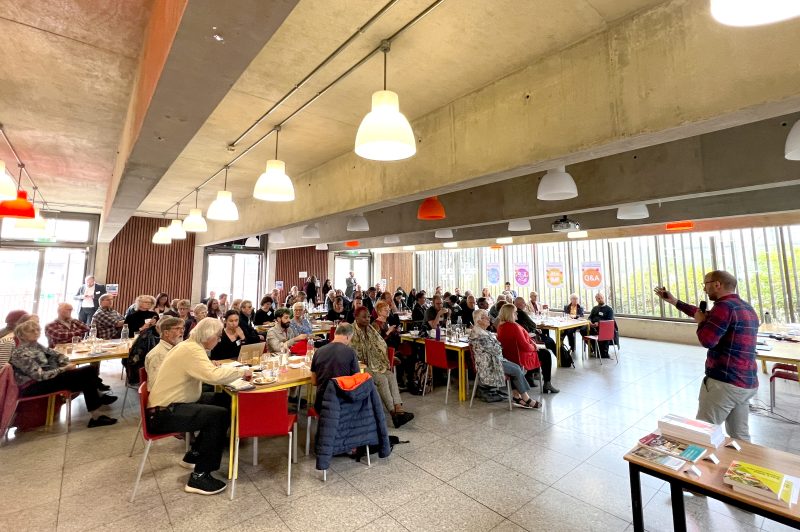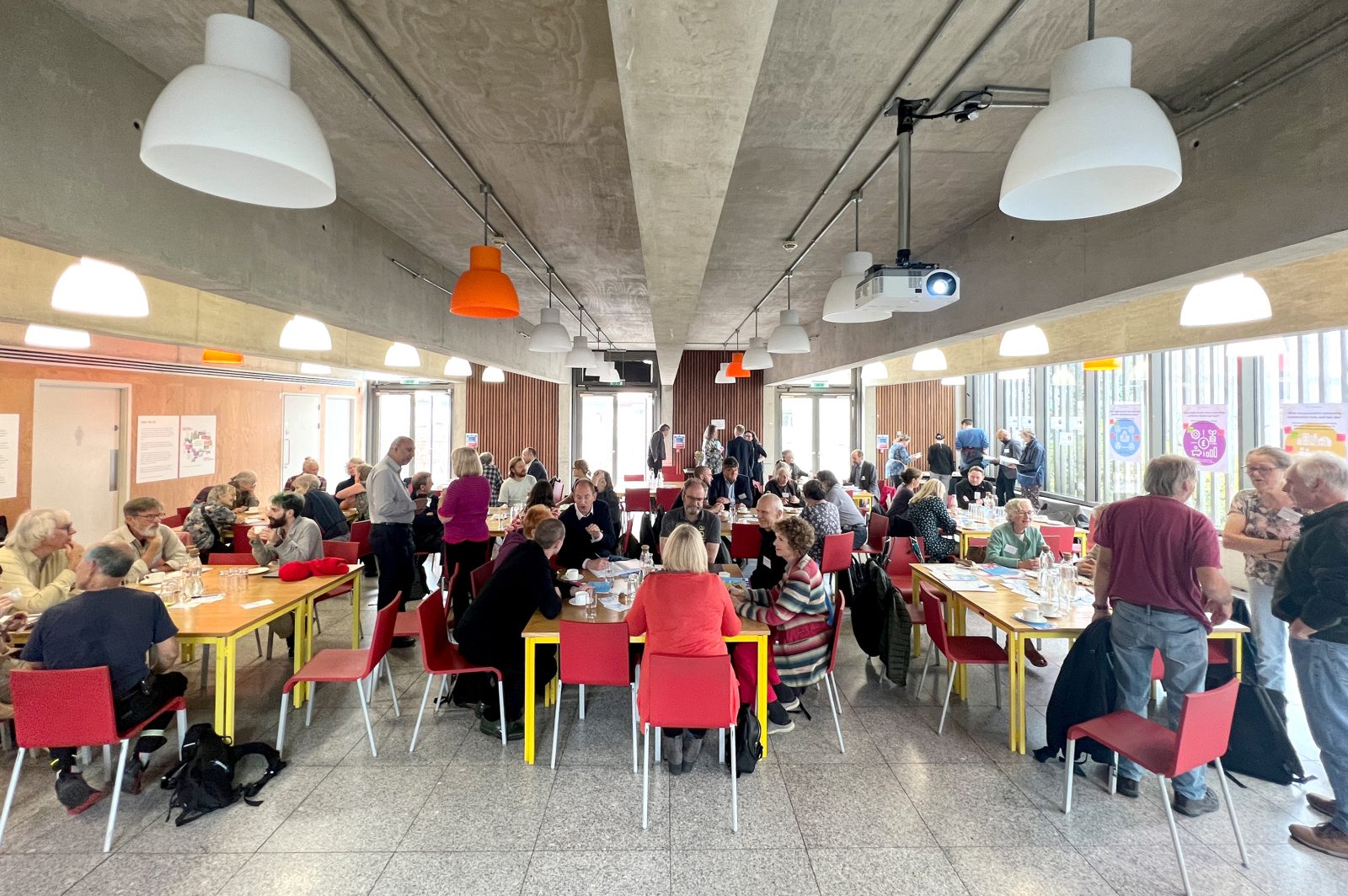20/20 Cohousing:
Celebrating the first 20 years and envisioning the next 20!
Download the Summit slide deck
Twenty years after the first purpose-built cohousing development opened its doors in the UK, we gathered in London to celebrate our success so far and envision the future of the movement. Our event brought together practitioners from the US, Canada, Denmark and New Zealand to join cohousing residents, architects, developers, funders and housing association staff. A summary of each of the day’s sessions can be found later in this article.
We now have over 25 cohousing neighbourhoods in the UK, with another 60 in the pipeline. All are innovating how neighbourhoods work and how we live together, and many are award-winning. With interest growing significantly for more inclusive, sustainable housing for people of all ages, we ask the question to our attendees – what is the vision for the next 20 years?
What is Cohousing?
Cohousing communities are high-functioning neighbourhoods created and run by their residents. Each household has a self-contained private home as well as shared community space. Residents come together to manage their community, share activities, and regularly eat together.
Cohousing originated in Denmark in the 1970s where it now boasts over 650 neighbourhoods . “Cohousing” was first coined by US architect Charles Durrett, who has personally developed over 55 projects. We were delighted to welcome him as our keynote speaker.
Themes for the Day
The spirit of the event was to bring together practitioners, funders and policymakers to promote conversations, confidence and connections to build the cohousing movement for the years ahead. Some key themes for the day included:
- How might we best grow the cohousing movement?
- Which pressing problems is cohousing best suited to tackle?
- How do secure land and funding for cohousing?
- How do we ensure we don’t lose quality for quantity?
- How do we meet a vision for diversity and inclusion?
Thanks to our Sponsors!
All three of our Summit Sponsors presented and participated throughout the day, and we wish to thank Wrigleys Solicitors, Ecology Building Society and TOWN for their support!



“I am impressed by the sheer diversity of projects and the global reach of cohousing as a concept. There is cause for optimism regarding plans for the future financing of self-commissioned projects”
– Jon Lee, Business Development Manager, Ecology Building Society
Introduction and Special Announcement:
UK Community Led Housing Growth Fund
Owen Jarvis, UK Cohousing Network
Owen shared headlines from a proposal submitted to the UK Government’s Housing Minister Rachel McClean by a coalition of organisations on behalf of the Community Led Housing movement earlier this month. The vision is to scale the community led housing sector to deliver 5% of all UK homes by 2035, achieved through creating new finance and delivery capability to infuse the housing industry with the philosophy of community led housing.
“The housing industry should be infused with the philosophy of community led housing”
– Recent speech by Secretary of State, Michael Gove
Over the next few months it should become clear whether the Government will support the call for:
- A long-term Community Led Homes Growth Fund to commission and deliver more homes
- A Growth Lab to support knowledge sharing and evolve practice among communities and organisations, building an ecosystem of intermediaries to support communities through the process
- Policy advancements to unlock more sites, grow cohousing to an initial target of 5% of all homes built in the UK by 2035 and put community needs at the heart of planning decisions
“20 years ago the doors opened at the first purpose built cohousing in the UK. September saw the opening of the 10th new build cohousing neighbourhood at CHACO in Leeds. Whilst each and every cohousing project is to be celebrated, how do we meet the demand and make it easier?”
– Owen Jarvis, UK Cohousing Network
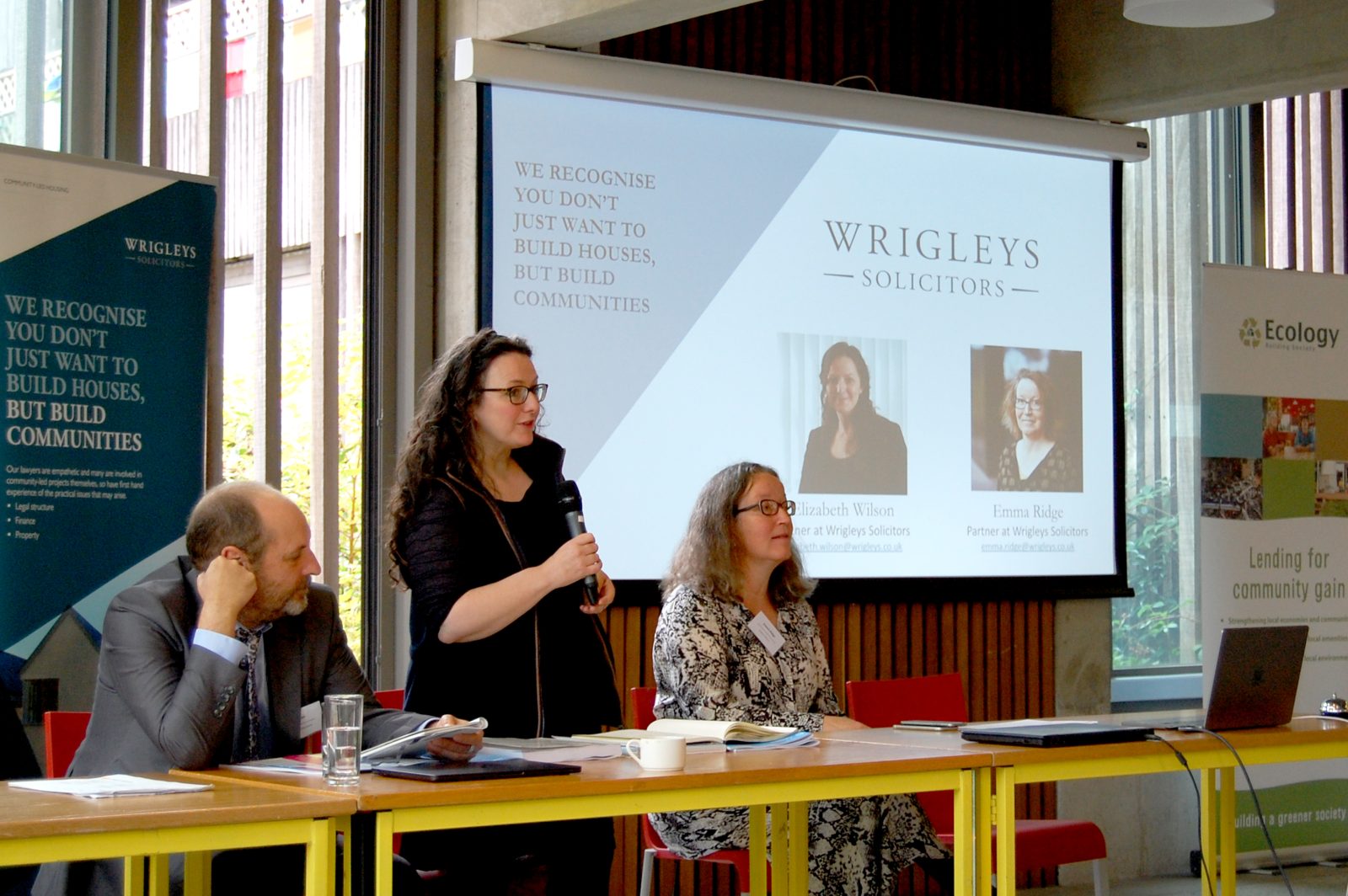
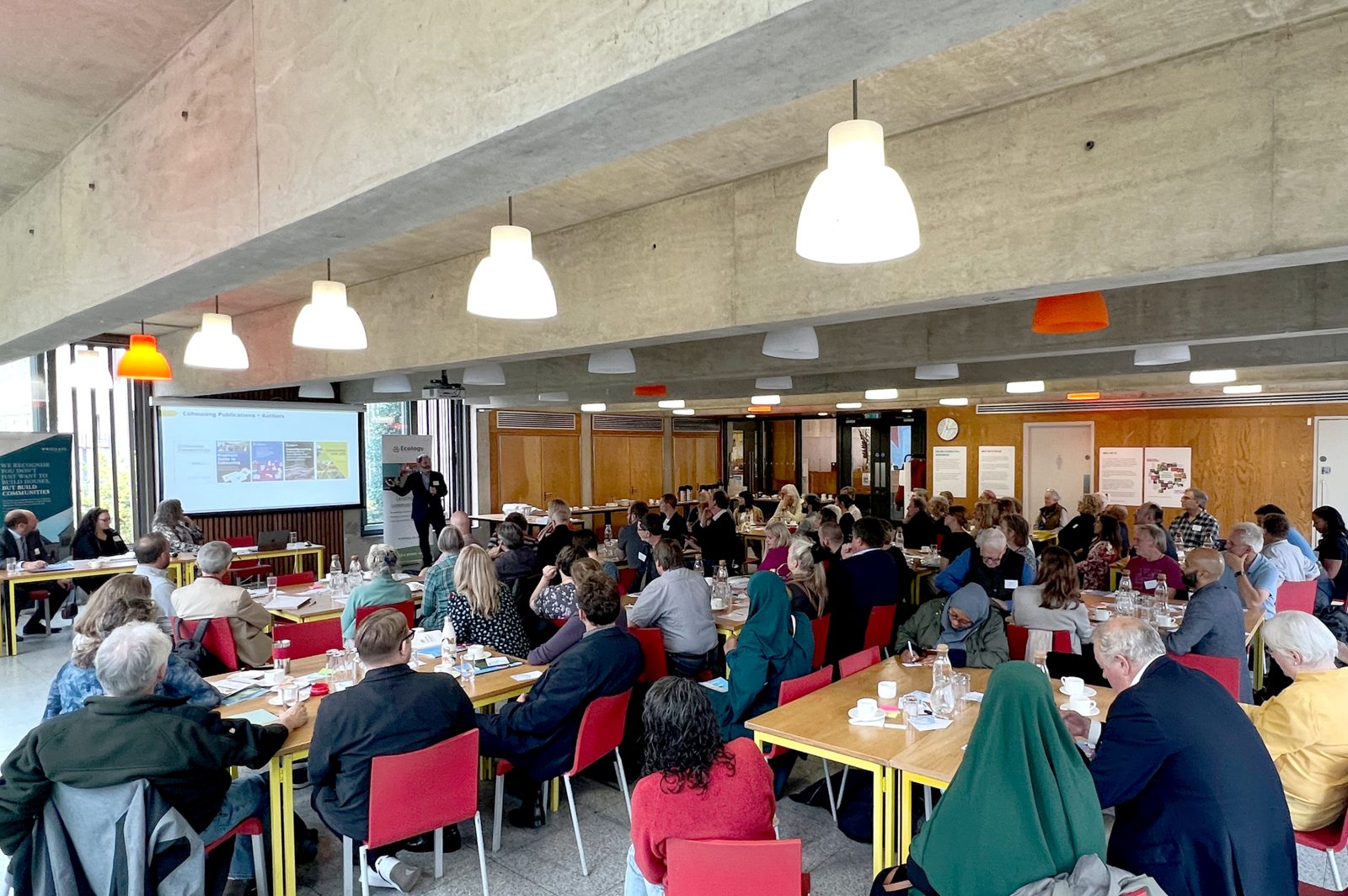
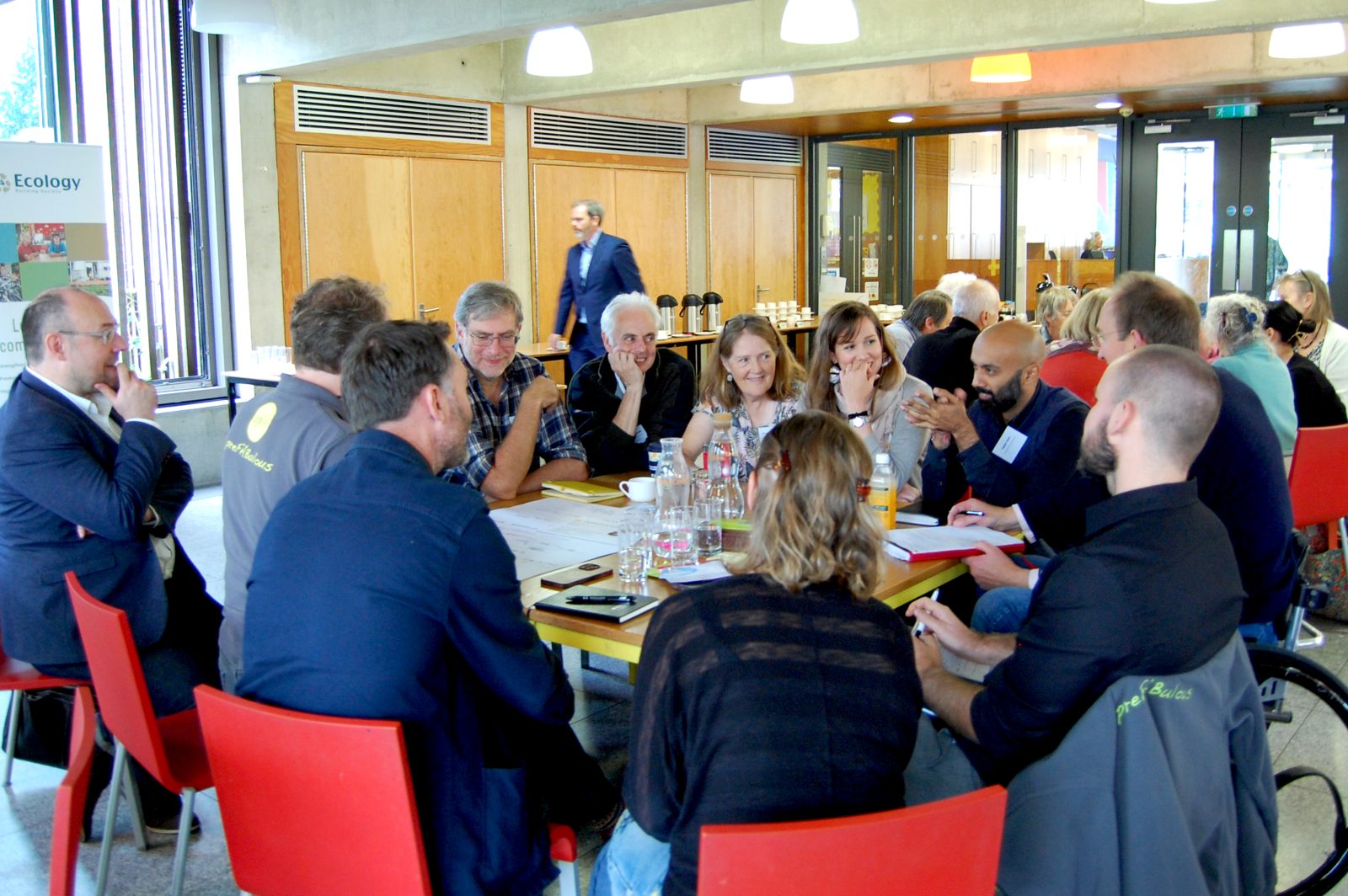
The Future of Group Led Cohousing
Angie Doran, Homes England
Angie Doran provided background to her pioneering new role as Head of Self Commissioned Housing. Her role was created in response to Richard Bacon MP’s review which recommended the delivery of custom and self-build housing (CSB) at scale across the country, and the creation of a Custom and Self-Build Housing Delivery Unit within Homes England.
“Community led housing is less risky and better for us than volume housing providers – how can we get the message across to insurers, mortgage providers and surveyors – we must demand better from our government”
– MP Richard Bacon.
The unit has three themes:
- To engage: to be outward facing but with inner buy-in.
- To Invest: to ensure uptake of existing funding and work to identify funding requirements and bring in more lenders for self build mortgages and community led housing – revenue and capital.
- To Deliver: To deliver more self commissioned homes, opportunities should be created on Homes England Land and through partnerships
The unit seeks to work with stakeholders and local authorities to remove barriers and ensure more plots are brought forward for self commissioned custom and self-built housing. Angie is highly supportive of community led housing and pointed to the work of Build Store as a company with good connections with mortgage providers.
“Cohousing is a form of collective custom built housing far more common in mainland Europe than the UK.”
– Angie Doran
Innovation, Partnerships, Cohousing
Bridport Cohousing and Dorset Council
Judith Griffies shared the story of the successful development of Bridport Cohousing CLT, through the lens of affordability. Bridport is the largest cohousing scheme in the UK at 53 units and was completed with the goals of being affordable to build, live-in and maintain.
Through its energy efficient design Bridport has very low energy costs, and it also saves money via communal food growing, shared resources and free labour from residents working together on projects. Despite these savings they were initially unable to gain funding for their common house – a central feature of cohousing. In response they completed a successful crowdfunding programme and are now self-building their common house using straw bale insulation through a series of training programmes open to the community and public alike.
Paul Derrien, Dorset Council’s Housing Enabling & Delivery Team Leader explained that Bridport received council support because it offered a significant number of additional affordable homes. The council supports the tried and tested Community Land Trust model, and so were reassured when the cohousing group adopted this form of governance. Importantly, the council team helped the group to meet social housing requirements without compromising the key elements of cohousing.
Thanks were given to the hard work of Bournemouth Churches Housing Association who are social housing delivery partners with the cohousing group within the scheme. The partnerships between cohousing groups and registered providers offers potential access to funding to deliver sites, particularly ones where there are viability issues.
Communities passionately presenting to council committees is unusual and makes a difference. Being a CLT is key to getting council support for cohousing in the South-West”
– Paul Derrien, Dorset Council
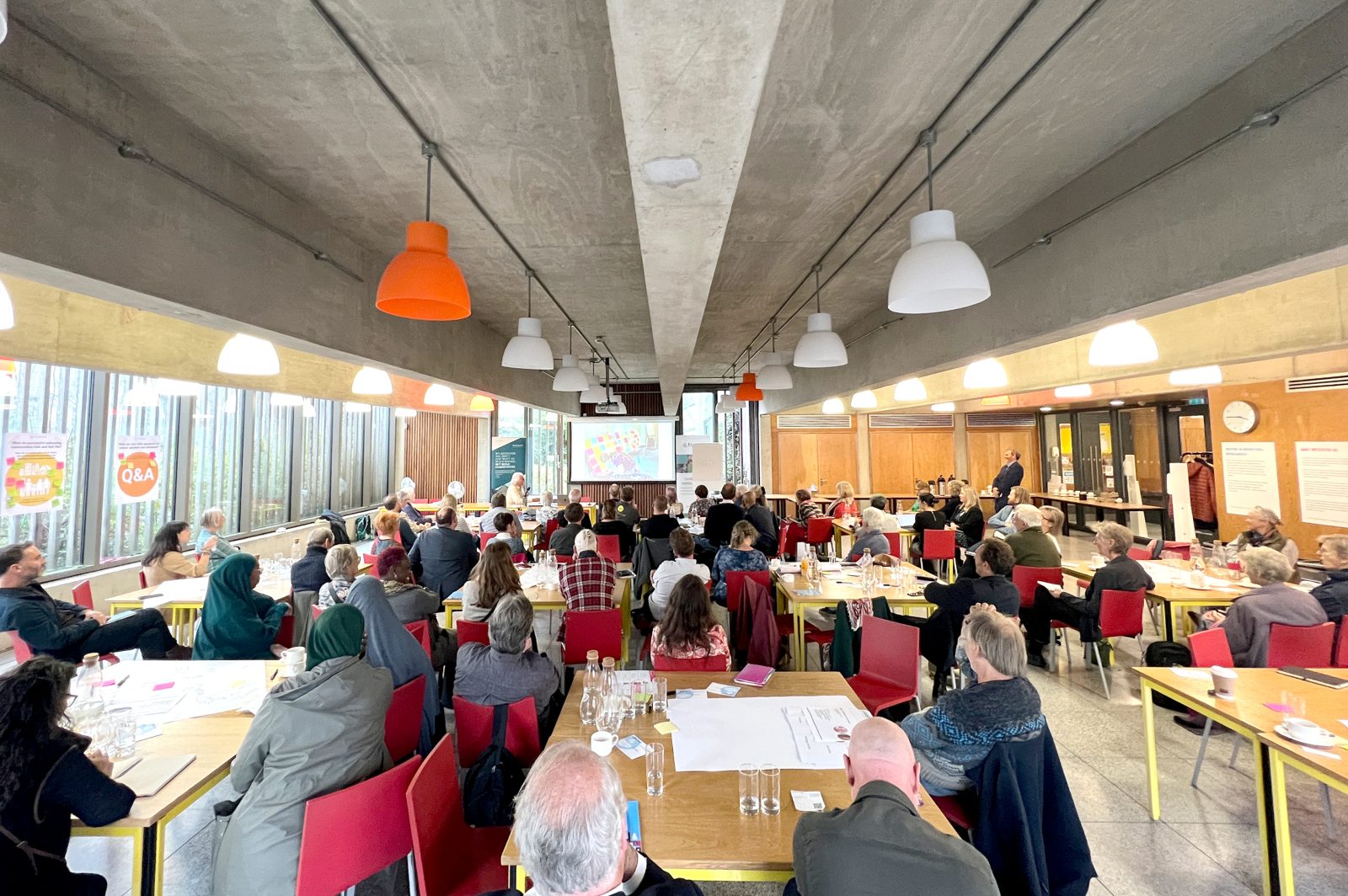
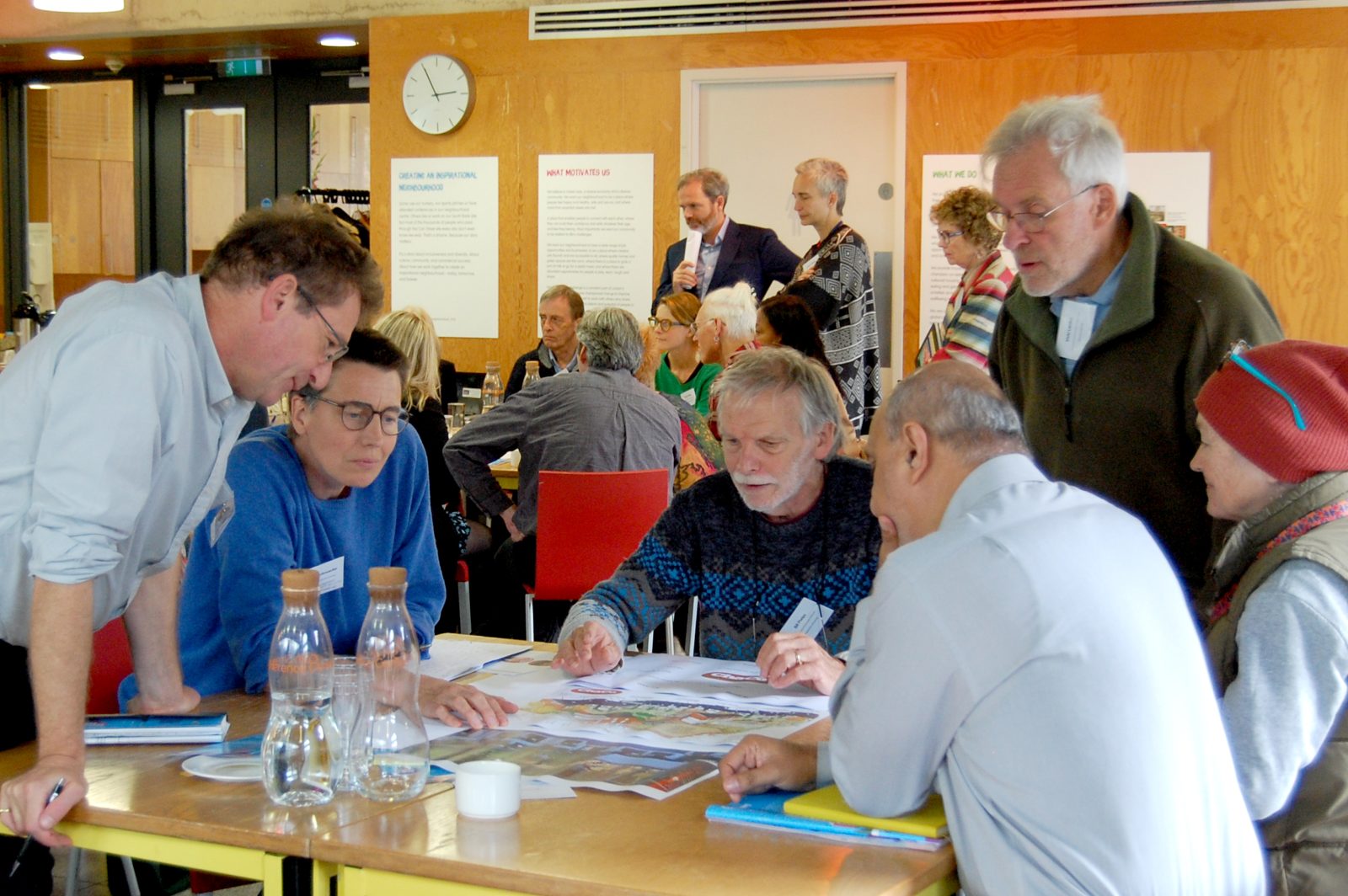
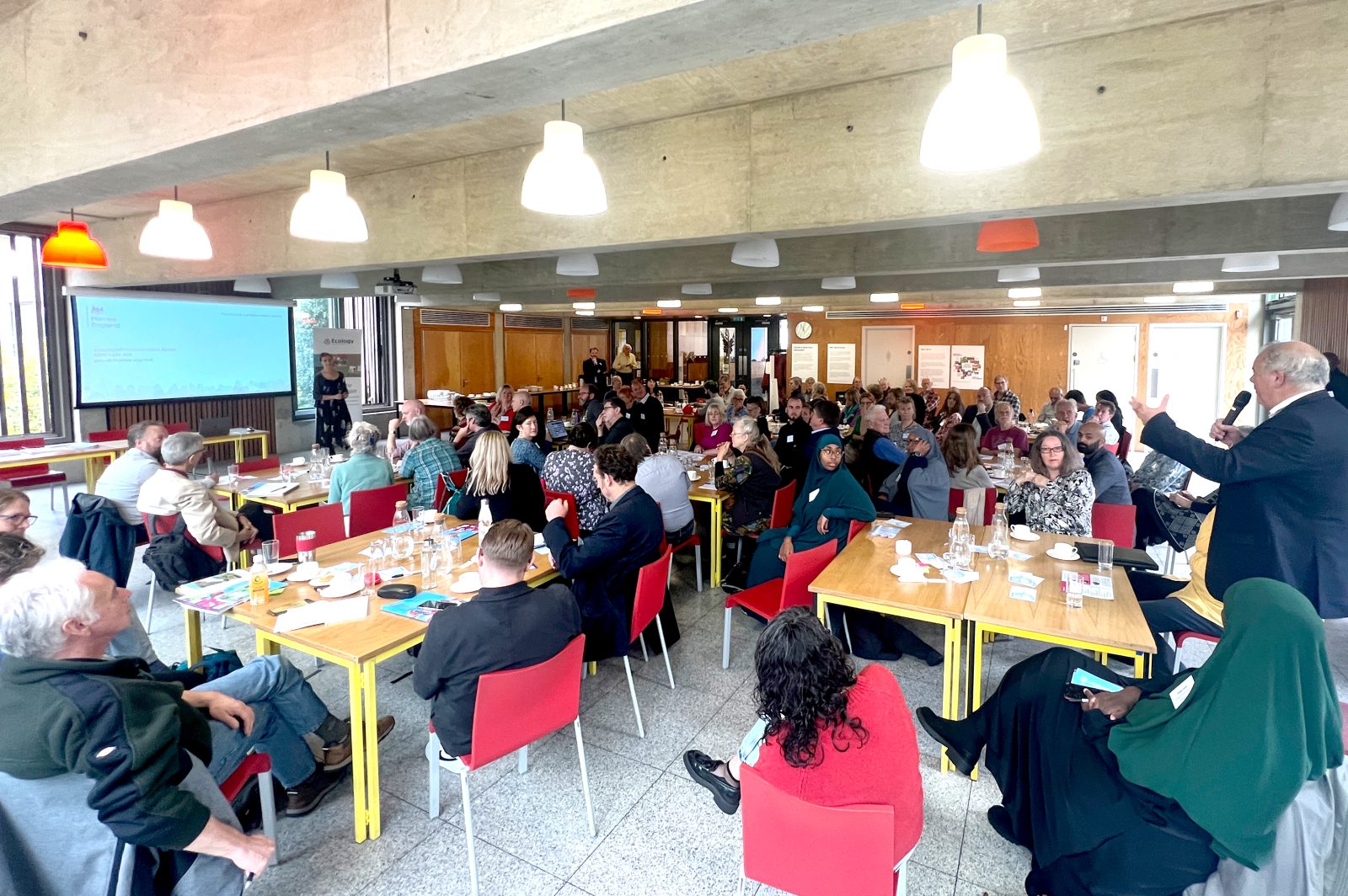
Special Presentation
to Springhill Cohousing, Stroud
UK Cohousing Network Chair Neil Stephens handed over a special plaque to David Michael, developer and co-founder of Springhill Cohousing, Stroud, which was the first purpose-built scheme in the UK in 2003. David said that after 20 years he still loved living in cohousing, and a new generation of families were moving in to continue the original vision.
Looking Ahead: Developer Led Cohousing
Jonny Anstead, TOWN
Jonny Anstead, co-founder of developer TOWN provided an overview of their progress to date, lessons learned and future plans. TOWN is the UK’s leading developer of cohousing with over 150 homes in progress across six new developments.
TOWN first became involved in cohousing via the Marmalade Lane site in Cambridge – with the council seeking a custom build solution for the site following the 2008 financial downturn. Jonny explained that the developer-enabled model of cohousing differs from the purely group-led version in a number of ways. TOWN can take a role in recruiting and supporting a group and finding a site. Importantly, the developer rather than the group funds the land purchase, planning and design phases – the latter being co-designed with residents. Completed homes are purchased by individual buyers and common areas are owned by the group.
TOWN are working with cohousing inspired projects in Milton Keynes, Cambridge, Oundle and Norwich. They are also completing a research project on the post-occupancy benefits of cohousing to be published next year. Anyone interested in future cohousing developments with TOWN can sign up for updates via their website.
Towards Inclusive Senior Cohousing
Lucy Hale, Housing 21
Yael Arbel, Sheffield Hallam University
Abdul A Ravat, The Abbeyfield Society
UK Cohousing Network has edited and published a guide on housing associations and cohousing schemes based upon Housing 21’s first 18 months of their cohousing strategy. Representatives of the Housing 21 focus group attended the summit to share some of the findings.
Lucy Hale provided a summary of their cohousing strategy to deliver up to 10 developments across Birmingham in some of the most diverse and underserved communities. Employing community engagement specialists Legacy West Midlands, Housing 21 have been committed to a full co-design process with local seniors in housing need, despite significant disruptions of the Covid lockdown.
Yael Arbel explained that given constraints of social housing regulators and feedback from local communities, it has become clear that the first build will be to a high standard and encourage neighbourliness and communal experience, but will not be a fully resident led or managed. Yael Arbel’s research team released a review of Housing 21’s co-production strategy next month and have recommended that the growth of cohousing can be achieved by ‘scaling out’: with housing associations supporting just one project each, the total number of cohousing developments in the UK would be over 1000.
Abdul A Ravat emphasised the inequalities of housing provision experienced amongst seniors from ethnic minority groups, and the onus resting with housing providers to respond to the Ageing Well Agenda. The room reflected on how we can better focus on diversity and inclusion in cohousing in the future, while remaining true to key cohousing tenets – namely residents having agency and stewardship of their homes and neighbourhoods.
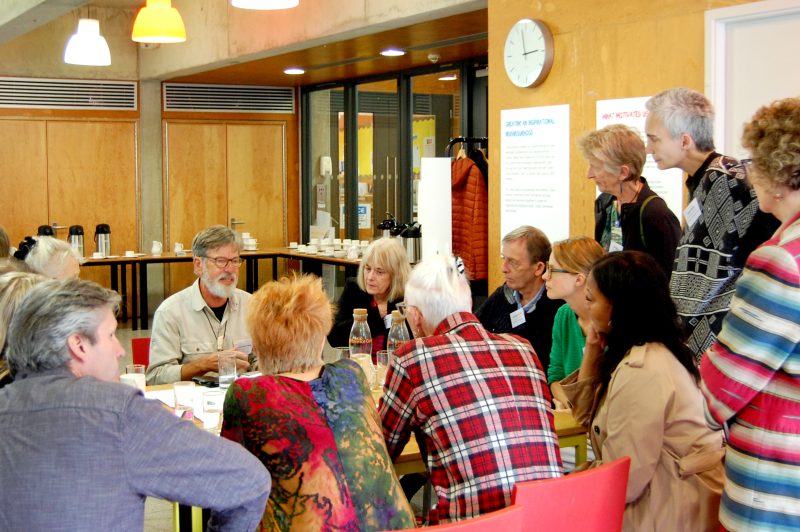
World Cafe Discussions
Guest Experts
With thanks to our cafe host experts:
Dr Penny Clark, Conscious Coliving
Birger Kristoffersen, Association of Cohousing, Denmark
Prof Kath Scanlon, Distinguished Policy Fellow and Deputy Director of LSE London
Simon Bayly, UKCN
Maria Brenton, Senior Cohousing Ambassador
Rachel Douglas, New Ground
Craig White, Agile Homes
Guy Harris, Accessible PRS
Yael Arbel, Chapeltown Cohousing
Bill Phelps, Chapeltown Cohousing
Our World Cafe activity was an opportunity for attendees to ‘speed date’ with seven experts, each hosting a table focused on a few key discussion points. Every 15 minutes, participants changed tables while the hosts built on the previous conversation. Some highlights from one table are given below as an example, but there was (intentionally!) far too many conversations to distil into this article.
Birger Krisofferson, Chair of the Association of Danish Cohousing:
- Over 40 years Denmark has created over 700 developments in a nation of 5 million people.
- The ideal size for cohousing is between 20-30 units, and it takes 3-5 years to get one built.
- Developer led involvement is increasing in the sector, with good & bad experiences.
- Commercialised developers are dictating minimums of 50 units, which is challenging relationships.
- Surveys show that 75% of the Danish population want to live in Cohousing.
- Denmark’s cohousing residents are largely middle class and white, with a recognised need to improve diversity.
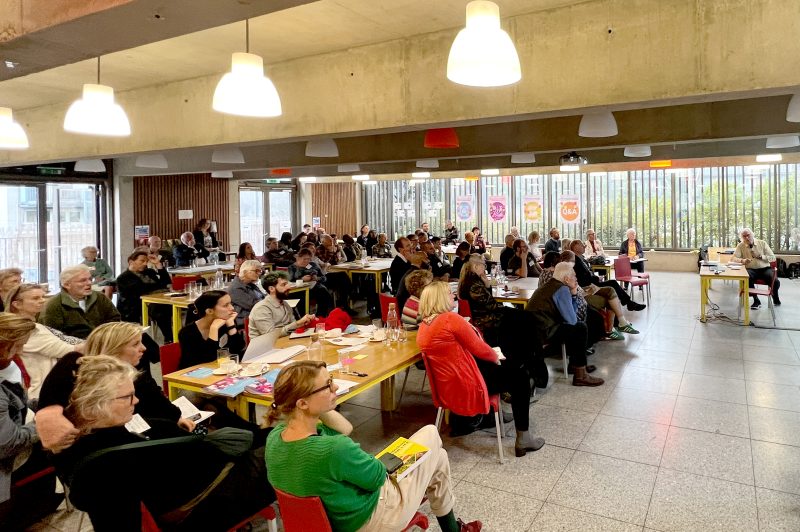
Keynote
Charles Durrett – The Cohousing Company
Charles “Chuck” Durrett is one of the world’s leading practitioners of cohousing. He brought the concept to the English speaking world following years of immersion in Denmark in the 1980s alongside its originators such as Jan Gudmand-Høyer. He felt an ethical obligation to thoroughly understand the model before returning to the US.
Since designing his first cohousing neighbourhood in 1991 he has gone on to develop 55 more, and has advised on countless others across the US and Japan. Co-written with Kathryn McCammant, his first book Creating Cohousing sold over 50,000 copies with the main buyer being the Danish government. Chuck has walked the talk, living in Nevada City Cohousing for over 20 years.
Chuck describes cohousing as first and foremost a cultural act, and then a political act and thirdly as a development act. In his new book Cohousing Communities – Designing for High-Functioning Neighbourhoods, Chuck details his co-design process inspired by Danish anthropologists he has worked alongside. Throughout a 12 session process Chuck remains attentive of the relationship between design choices and their impact on future lived experience. His aim is to create neighbourhoods that fit the needs and aspirations of its residents “like a glove” rather than “like a shopping bag” typical of mainstream housing.
Chuck explained how practitioners in Denmark ‘do the social maths’ measuring how design links to social activities which lead to results within cohousing. He reflected on how getting the design of the common house right is critical to high-functioning neighbourhoods: A welcoming, suitably sized and sound-proofed common house will promote eating and meeting together regularly which in turn helps discussions and resolutions of small problems early and informally. Poor design has the opposite effect and may lead to key people burning out or becoming frustrated. Surprisingly, the more often a community eats together, the fewer attendees there are at each meal, and the size of a common house can be smaller.
Chuck observes that cohousing can be regarded as “front garden” neighbourhoods. Residents seen as introverted or private before cohousing, shift towards preferring the front porch to their back gardens in order to greet neighbours as they pass. “If it’s not social, it’s not worth it” is Chuck’s motto, and he quotes Mohammed Ali’s shortest poem in the English language as summarising the values of cohousing: “Me, We”. Packing 40 years experience into a 30 minute presentation was a challenge but Chuck left the audience inspired and wanting more.
“We want to create high-functioning neighbourhoods that help us fulfil our potential. The original Danish design values and group processes are key to doing that”
– Chuck Durrett, The Cohousing Company.
Conclusion and Next Steps
The summit was the first face-to-face meeting in 6 years. The event was sold out with a waiting list, most attendees arrivved early to start making connections, and stayed well after the sessions had ended, continuing into the evening over dinner. Books and reports available for purchase on the day sold out. Our sponsors, Wrigley’s Solicitors, Ecology Building Society and TOWN were all delighted with how the day went, with attendees calling for summits on a regular basis.
The event showcased how far the movement has come since the first new build project launched in Springhill in 2003, the range of innovation and diversity of approaches. We enjoyed an exceptional standard of presentation, speakers and audience participation throughout the day and significant optimism for the potential of the movement to grow and flourish. Investors, policy makers, providers and planners are all called upon to enable the movement to reach its potential to improve the housing system in the next 20 years.
The movement awaits news on potential government support for long-term funding for the community led housing sector in the autumn statement/before the 2024 general election.
Be part of the cohousing movement!
Sign up to opportunities to live in cohousing developments
Support the cohousing movement by becoming a member
Read our guide to cohousing
Check out our guide to community coaching
Read our guide to housing associations and cohousing
We were delighted to have a sold out and successful event, and will be in touch with sponsors and members of the cohousing movement about 2024/25!
The Radical Housing Conference takes place in Bristol on October 12
Charles “Chuck” Durrett is considering a return to the UK in 2024.
Attendees are encouraged to follow up on ‘Coffee Card’ conversations and connections made on the day.
And finally, thanks to all for a wonderful day of learning and conversations!
